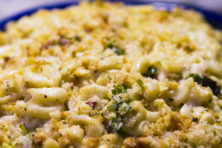Grandma’s Unintentional Conservation Lesson
- Share
- Tweet
- Pin
- Share
I got an early lesson.
My grandmother was disgusted when she said it, shaking her head and looking away from me and off into the distance.
“You kids are so extravagant,” she proclaimed, with special emphasis on the last word.
Until that moment I’d been having a pretty good day. I thought I had marked a pretty good haul of football cards for my $12 and was already on my second pass through, reading the stats on the back and debating whether to organize them alphabetically or by team. But my grandma couldn’t believe I’d just spent $12 on cards.
Helen Dannhausen was born in 1908, and died in 1996. She grew up in the days before everyone had a car, running water, and electricity. Her early adult years were lived during the Great Depression, followed by the home front sacrifices of World War II. The influence of these experiences was still felt 50 years on. Now, she wasn’t a product of the poor house – she lived moderately well – but dollars were precious to her, as they were for nearly everyone in her generation.
I was 18 when she passed away, and in the 18 years I knew her she had the same furniture, dishes, silverware, appliances – even the same jars for coffee, sugar, and salt. Her patio furniture was made of wood, and we sat in it every sunny day for nearly 20 summers.
How many of us today keep the same furniture for two decades? How many years pass before we replace our plastic patio chairs and tables? How long do we go before buying a new coffee maker, toaster, or set of dishes?
When we talk seriously about moving toward a more sustainable society – beyond recycling and programmable thermostats – it can get frightening. There are valid, dire predictions of great population loss, terribly altered landscapes, and sacrifices great and small.
At the root of our current climate problem is the simple reality that we use too much. Of everything. We eat too much, buy too much, throw away far too much, and waste so very much.
Sustainability and going green isn’t just about recycling, or saving water, or complicated new technologies. What it’s really about is not being so careless anymore.
It’s about not just finding the best price, but the best value. That includes how long a product will last, and what buying it will do for society as a whole. A brief conversation with Polly Helm at Door County Nature Works about furniture got right to the point.
“People need to start thinking about the quality of the products they buy,” she said. “You can buy cheap furniture, but in three years it’s going to be in a landfill, where if you buy something better it’s going to last 20 years and will often cost less in the long run.”
It’s this kind of thinking that has gone by the wayside in the era of cheap labor, cheap products, and cheap living. How many CD and DVD players have you disposed of? How about cell phones? Speakers? Lamps? We now expect to replace these things in a year or two when fashions change or the product just quits on us.
Go back a generation or two. How often did your family get a new record player? A new TV? A new car?
We don’t need to revert to hunter-gatherer life, or even horse-and-buggy, if we wake up to the evidence before us today. A pretty large, positive step for industrialized nations can be taken for much less.
Maybe it means every residence won’t have a car in the driveway for each resident. Maybe every room won’t need a TV, and every child an iPod. There’s a good chance we’ll have to grow some of our own food closer to home and give up certain foods when out of season. It’s possible we won’t have a thousand square feet for each person in our home, or a bathroom per person.
Does that sound so bad? Or does it sound a lot like the way many of us grew up? Combine this shift with advancements in energy efficiency and we’d be in remarkably better shape in the decades ahead.
In our second annual Sustainability Issue, we’re once again highlighting many of the Door County businesses taking steps toward some less consumption-driven goals.
It’s often the actions of the big cities that garner all the headlines. Banning plastic bags, taxing bottled water, and increasing public transit are all worthy actions and in huge population centers make a massive impact. But it may be that the better, deeper story is the one unfolding here on the Door Peninsula, where the movement is becoming more about a community effort than individual actions.
The Natural Step is changing attitudes in government, Vinni Chomeau is working the theme into education at Gibraltar School, and Death’s Door Brewery is keeping things local on Washington Island, as you’ll see in the pages ahead.
It’s an exciting time to be here. Businesses big and small are re-evaluating how they operate in a rare environmental race to the top, competing to be greener, striving to be better stewards of our greatest marketing tool – our beautiful landscape.
And it’s an exciting story to tell. In the pages to come, we hope you’ll find we’ve told it well, though we admit we’ve only scraped the surface of all that’s taking place.
And if my grandma gets her hands on this somewhere, maybe she’ll see this effort and forgive my childhood “extravagance,” and know a lesson was learned.



